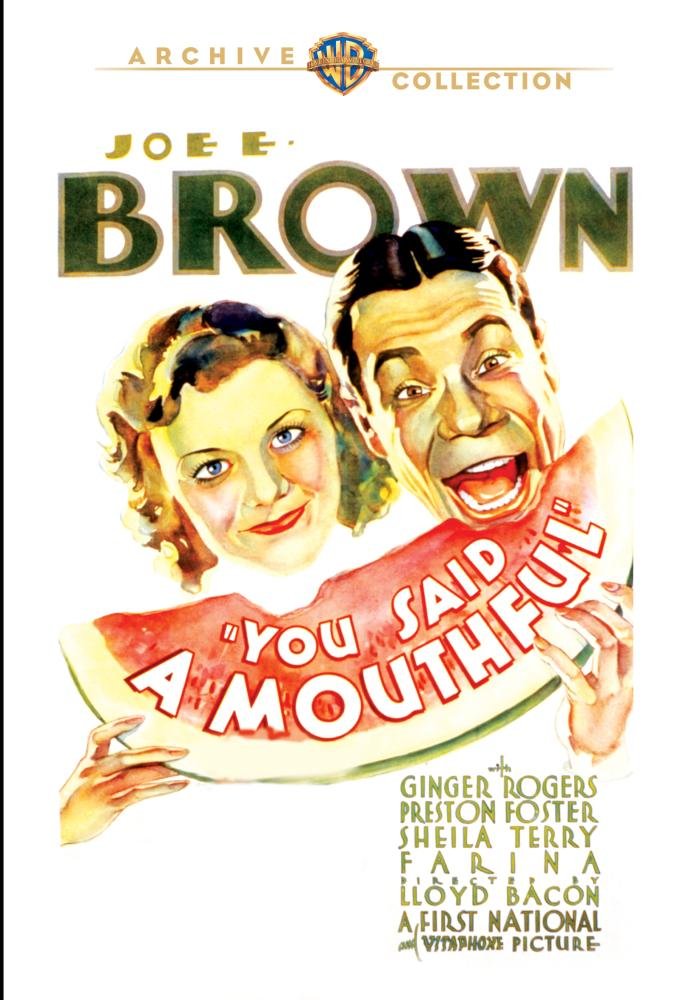
I suppose there’s little argument to be had in the speculation that we as a species have a tendency to assign labels and stereotypes onto individuals within certain fields. And one of two prime examples that you can find in the pre-Code 1932 Vitaphone comedy You Said a Mouthful is in its very own leading comedian, the great Joe E. Brown. Thanks to our habit of socially profiling comics as unathletic eccentrics, it can really slap you in the face when you note that Brown was not only a professional baseball player in his earlier years, but that he kept quite fit throughout his entire life. And when we first see our hero in You Said a Mouthful playing the part of an unathletic eccentric, the last thing you expect to see is a decidedly well-constructed body as he dons one of those weird old bathing suits people actually used to wear.
But it happens just the same. Starting out as a shipping clerk at a bathing suit company on the East Coast, Joe (which is also his character’s name) is the very epitome of a loser. He wears glasses. The entire staff makes cruel practical jokes at his expense. He’s even afraid of the water, too. So much so, that he invents a new unsinkable bathing suit to save people the horrifying experience of drowning. But no one takes him seriously, of course. And when word arrives that his last-remaining relative – a wealthy aunt in California – has passed away, leaving her entire estate to him, Joe packs up his few belongings and heads to the West Coast for what must surely be a vast fortune. Instead, he winds up with a little more than five dollars and a young black ward (surely giving Conrad Bain an idea or two), played by former Our Gang icon Allen Hoskins, billed here (and better known) under his “Farina” alias.
And it is there that the film’s other instance of profiling and stereotyping comes into play, as Farina (in one of his final film roles, before enlisting in World War II, followed by a final career in rehabilitation) is introduced as a joke. Fortunately, he evolves beyond that fairly well, even going so far as to become Joe’s “trainer” when he is mistaken for a first rate Canadian champion swimmer of the same name and made an honored guest as a plush Catalina estate. And were it not for the fact that his benefactors included a beautiful young blonde lass played by a barely-recognizable Ginger Rogers (still sportin’ a bit of baby fat), Joe wouldn’t even bother keeping up the charade. But love makes unathletic eccentrics do weird things: like engage in a crash course in swimming so that he can not only win a death-defying race from the island to the mainland (seriously, such a thing actually did happen once back then), but her heart as well.
Upon first release, You Said a Mouthful sported artwork much like the DVD’s cover: with a caricature of Brown and a rendering of a decidedly crazy-looking Ginger Rogers (which bears a shocking resemblance to my ex-girlfriend) eating watermelon. The artwork also sported the oh-so-politically incorrect depiction of Mr. “Farina” Hoskins joyfully munching on the pepo just beneath them – despite the fact that no such scene appeared in the film (or if it did, it has since been excised), and appeared to have been little more than a classic case of exploitation artwork. Needless to say, the Warner Archive decided to alter the artwork for this release to exclude that bit in order to save itself from any potential controversy – which I understand fully, but which at the same time slightly saddens me. (Sure it’s offensive, but we can’t change history, so such things should be viewed from their historical perspective as opposed to playing to the overly-sensitive people in an otherwise desensitized world. End rant.)
Sporting more than its share of prime Joe E. Brown moments (his practice strokes have to be seen to be believed) and quips, You Said a Mouthful manages to stay afloat throughout. Preston (S.) Foster delivers one of his earliest performances here as the “bad” guy also vying for Rogers’ affection, and who eventually develops a partnership with one of Joe’s old work colleagues, Harry Gribbon. Walter Walker, who would later co-star with Rogers in Flying Down to Rio, appears here as her father; Edwin Maxwell plays the family doctor; and the familiar face of movie heavy extraordinaire Guinn “Big Boy” Williams plays the real championship swimmer our hero gets mistaken for. 42nd Street director Lloyd Bacon helms this talkie transition piece that has been rescued from the vaults by the Warner Archive Collection, who present the film in its intended academy aspect ratio with a surprisingly beautiful transfer and mono soundtrack, and with the original theatrical trailer accompanying.